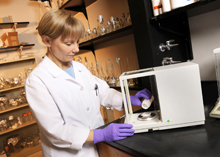
Researchers at Emory University received $520.3 million from external funding agencies in fiscal year 2012, marking the third straight year of greater than half a billion dollars in research funding.
Federal agencies awarded more than $349 million, or 67 percent of the total, led by the National Institutes of Health (NIH), with $299 million in awards. NIH funding represented 86 percent of total federal dollars awarded to Emory and more than 58 percent of all funding received.
Researchers in Emory's Woodruff Health Sciences Center (WHSC) received $483.4 million, or approximately 93 percent of the University total. The WHSC includes schools of medicine, public health, nursing, Yerkes National Primate Research Center, Winship Cancer Institute and Emory Healthcare.
"We are grateful that federal agencies and other sponsors continue to recognize and invest in Emory to help ensure our continuing contributions to the betterment of society through research and scholarship," says Emory President James W. Wagner. "Sustaining this high level of external funding through competitively awarded grants is a direct reflection of the quality of our research programs and the dedication of our faculty and their team members."
Emory University School of Medicine received $331 million, or approximately 64 percent of the total dollars awarded. The Rollins School of Public Health received nearly $74 million, Yerkes National Primate Research Center received $67 million, and Emory's Nell Hodgson Woodruff School of Nursing received more than $7 million.
"Our research faculty deserve tremendous credit for their hard work in both applying for grants at a very high rate and for the quality of their research that continues to attract this significant level of external funding," says David S. Stephens, vice president for research in Emory's Woodruff Health Sciences Center. "Support for biomedical research is essential for cures and progress in treating and preventing diseases, but this could be threatened in the future by possible severe federal budget cuts."
The value of biomedical research extends well beyond new cures and disease treatment and prevention, says Stephens. In Georgia, nearly 19 high-paying jobs are generated per $1 million in research funding, according to a 2011 analysis by United for Medical Research, a coalition representing leading research institutions, patient and health advocates and private industry. And university research discoveries often are translated into commercial applications that positively impact the economy while offering medical advances to patients more quickly.
